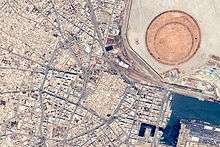Sfax
Sfax (Arabic: صفاقس ![]()
Sfax صفاقس | |
|---|---|
 .jpg) 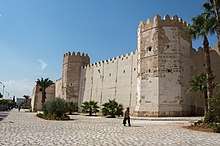  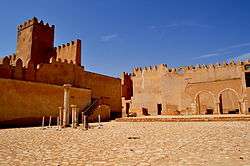 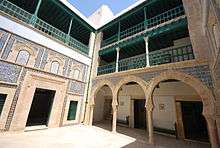 Clockwise from top: the Great Mosque of Sfax and the medina skyline, Cafe Sidi Boussaid, Borj El Guennouni, Dar Jellouli Museum, Kasbah of Sfax, City Walls, Sidi Amor Kammoun Mosque | |
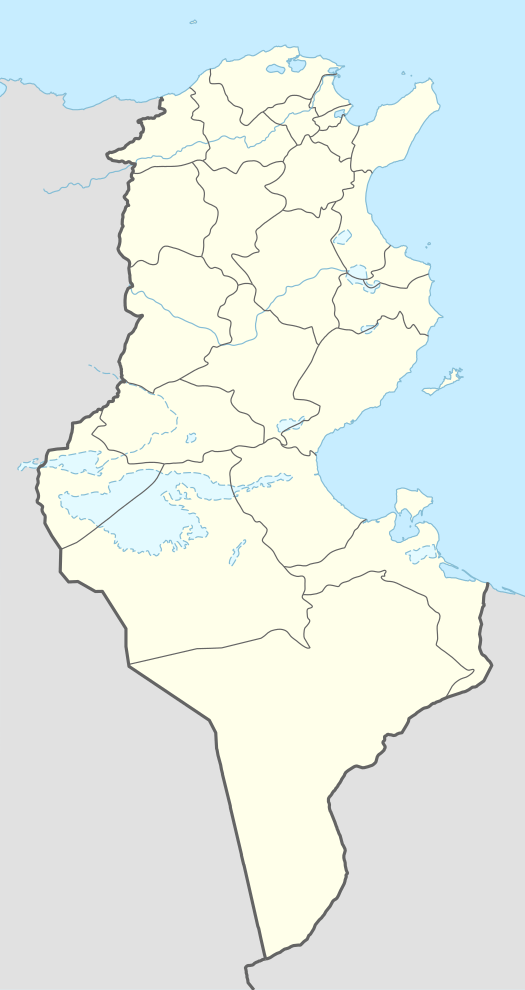 Sfax | |
| Coordinates: 34°44′N 10°46′E | |
| Country | |
| Governorates | Sfax Governorate |
| Government | |
| • Mayor | Mounir Elloumi |
| Population (2014) | |
| • Total | 330,440 |
| Time zone | UTC+1 (CET) |
| • Summer (DST) | UTC+1 |
History
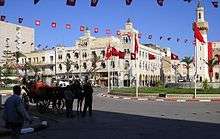
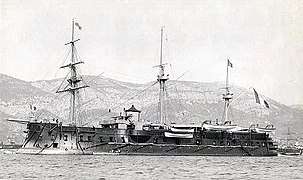
Present-day Sfax was founded in AD 849 on the site of the ancient Roman town (civitas) of Taparura. The modern city has also grown to cover some other ancient settlements, most notably Thenae in its southern suburb of Thyna.
By the end of the 10th century, Sfax, had become an independent city-state. The city was conquered by Roger II of Sicily in 1148 and occupied until it was liberated in 1156 by the Almohads, and was briefly occupied by European forces again; this time by the Spanish, in the 16th century, before falling into Ottoman hands this time. Sfax became an integral base of the Barbary piracy, prompting an unsuccessful invasion by Venice in 1785.
When the Bey of Tunis signed the Bardo Treaty, in 1881, making Tunisia a protectorate, an insurrection broke out in Sfax. Six ironclads were dispatched from Toulon (Colbert, Friedland, Marengo, Trident, Revanche, Surveillante) to join the French Navy ships in Tunisian waters. In Sfax, three ironclads from the Division of the Levant were already present (Alma, Reine Blanche, La Galissonnière), together with four cannon boats.[3] Sfax was bombarded, and on 16 July the city was taken by the French after hard fighting, with 7 dead and 32 wounded for the French.[3]
During World War II, the Axis powers used the city as a major base until British forces took it on 10 April 1943. After World War II, Tunisia was returned to France, but gained independence in 1956.
Transport
The A1 motorway connects Sfax with Tunis. A narrow gauge railway system of SNCFT offers passenger services to Tunis and delivers phosphates and iron ore for export. Sfax is served by Sfax–Thyna International Airport and Syphax Airlines has regularly scheduled flights to Paris-Charles de Gaulle Airport, Montréal–Pierre Elliott Trudeau International Airport, Sabiha Gökçen International Airport, Tripoli International Airport, and charter flights to Jeddah Airport for the pilgrimage to Mecca.
Communications
Founded in 1961, Radio Sfax broadcasts twenty hours a day[4] on MW 720 kHz/105.21 MHz.[5]
Climate
Sfax has a hot semi-arid climate (Köppen BSh). Owing to its sheltered location relative to Mediterranean Sea winter storms, Sfax receives half the rainfall of Tunis and less even than the major cities of Libya (Tripoli and Benghazi). Summers, like all of North Africa, are hot and almost rainless, whilst winters are very pleasant with only light rain usual.
| Climate data for Sfax (1981–2010, extremes 1950–2017) | |||||||||||||
|---|---|---|---|---|---|---|---|---|---|---|---|---|---|
| Month | Jan | Feb | Mar | Apr | May | Jun | Jul | Aug | Sep | Oct | Nov | Dec | Year |
| Record high °C (°F) | 26.8 (80.2) |
32.7 (90.9) |
36.9 (98.4) |
37.2 (99.0) |
41.3 (106.3) |
47.8 (118.0) |
47.2 (117.0) |
46.8 (116.2) |
43.5 (110.3) |
38.2 (100.8) |
34.5 (94.1) |
28.6 (83.5) |
47.8 (118.0) |
| Average high °C (°F) | 17.1 (62.8) |
18.1 (64.6) |
20.2 (68.4) |
22.5 (72.5) |
26.0 (78.8) |
29.9 (85.8) |
32.7 (90.9) |
33.2 (91.8) |
30.5 (86.9) |
27.1 (80.8) |
22.3 (72.1) |
18.2 (64.8) |
24.8 (76.7) |
| Daily mean °C (°F) | 11.5 (52.7) |
12.3 (54.1) |
14.6 (58.3) |
17.2 (63.0) |
20.9 (69.6) |
24.6 (76.3) |
27.3 (81.1) |
28.0 (82.4) |
25.6 (78.1) |
22.1 (71.8) |
16.8 (62.2) |
12.7 (54.9) |
19.5 (67.0) |
| Average low °C (°F) | 6.4 (43.5) |
7.0 (44.6) |
9.3 (48.7) |
12.0 (53.6) |
15.7 (60.3) |
19.2 (66.6) |
21.6 (70.9) |
22.8 (73.0) |
21.1 (70.0) |
17.6 (63.7) |
11.8 (53.2) |
7.8 (46.0) |
14.4 (57.8) |
| Record low °C (°F) | −2.3 (27.9) |
−1.2 (29.8) |
−1.0 (30.2) |
2.0 (35.6) |
6.1 (43.0) |
10.6 (51.1) |
13.6 (56.5) |
13.2 (55.8) |
11.2 (52.2) |
5.2 (41.4) |
2.0 (35.6) |
−1.0 (30.2) |
−2.3 (27.9) |
| Average precipitation mm (inches) | 30.1 (1.19) |
13.5 (0.53) |
21.8 (0.86) |
19.1 (0.75) |
13.2 (0.52) |
4.2 (0.17) |
1.2 (0.05) |
4.2 (0.17) |
24.9 (0.98) |
36.6 (1.44) |
25.1 (0.99) |
29.0 (1.14) |
222.9 (8.79) |
| Average precipitation days (≥ 1.0 mm) | 3.4 | 3.3 | 3.7 | 2.8 | 1.7 | 0.6 | 0.2 | 0.5 | 2.5 | 3.6 | 2.8 | 2.9 | 28 |
| Average relative humidity (%) | 65 | 63 | 63 | 63 | 62 | 60 | 59 | 63 | 65 | 66 | 65 | 66 | 63 |
| Mean monthly sunshine hours | 198.4 | 201.6 | 238.7 | 258.0 | 310.0 | 333.0 | 378.2 | 347.2 | 273.0 | 241.8 | 210.0 | 195.3 | 3,185.2 |
| Mean daily sunshine hours | 6.4 | 7.2 | 7.7 | 8.6 | 10.0 | 11.1 | 12.2 | 11.2 | 9.1 | 7.8 | 7.0 | 6.3 | 8.7 |
| Source 1: Institut National de la Météorologie (precipitation days/humidity/sun 1961–1990)[6][7][8][note 1] | |||||||||||||
| Source 2: NOAA (humidity and sun 1961–1990)[10] | |||||||||||||
| Jan | Feb | Mar | Apr | May | Jun | Jul | Aug | Sep | Oct | Nov | Dec |
|---|---|---|---|---|---|---|---|---|---|---|---|
| 16 °C (61 °F) | 15 °C (59 °F) | 15 °C (59 °F) | 17 °C (63 °F) | 19 °C (66 °F) | 22 °C (72 °F) | 26 °C (79 °F) | 28 °C (82 °F) | 27 °C (81 °F) | 25 °C (77 °F) | 22 °C (72 °F) | 18 °C (64 °F) |
Education
The University of Sfax includes:
- ENIS (École Nationale d'Ingénieurs de Sfax) issued a number of well-known scientists and industrialists.[12]
- ESCS (École Supérieure de Commerce de Sfax) issued a number of managers, Economy and Management researchers and young entrepreneurs.[13]
- FLSHS (Faculté des Lettres et des Sciences Humaines de Sfax) issued a number of renowned poets and prose writers.[14]
- Sfax Faculty of Medicine (Faculté de Médecine de Sfax).[15]
- ISAAS (Institut Supérieur d'Administration des Affaires de Sfax)[16]
- FSEGS (Faculté des Sciences Économiques et de Gestion de Sfax).[17]
- FSS (Faculty of Science Sfax) .[18]
- ISIMS (Institut Supérieur d'Informatique et de Multimédia de Sfax).[19]
- FDS (Faculté de Droit de Sfax)(http://www.fdsf.rnu.tn/)
- ISAMS (Institut Supérieur des Arts et Métiers de Sfax)
- IHEC (Institut des Hautes Etudes Commerciales de Sfax)
Sport
- CS Sfaxien, a club of football (soccer), volleyball, basketball and rugby.
- Sfax Railway Sport
- Stade Sportif Sfaxien
Notable people
- Max Azria, fashion designer
- Mamdouh Bahri, artist, composer and jazz guitarist and teacher now living in France
- Hédi Bouraoui, poet and writer now living in Canada
- Nouri Bouzid, film director
- Hamdi Braa, basketball player
- Mohamed Charfi, academic, politician, jurist and scholar
- Moncef Dhouib, director and screenwriter
- Tom Dixon, industrial designer
- Mohamed Fourati, surgeon
- Mohamed Gouaida, footballer
- Farhat Hached, trade union leader assassinated by the French government
- Mohamed Jamoussi, artist, poet, composer and famous singer
- Claude Kayat, Franco-Swedish writer and dramatist, winner of the 1997 Prix Ève Delacroix
- Mounir Laroussi, scientist, inventor
- Christian Lauba, composer
- Mansour Moalla, former Minister of Economy, economist and banker
- Georges Perec, writer
- Hatem Trabelsi, former football player for Ajax Amsterdam, Manchester City and the Tunisian national team
- Saber Rebaï, Tunisian pan-Arab singer and composer
International relations
Twin towns — sister cities
Sfax is twinned with:
See also
- Fossa regia
- Sfax War Cemetery
- Sufax, a possible etymon of Sfax
- Transport in Tunisia
References
- Cities of the Middle East and North Africa : a historical encyclopedia. Dumper, Michael., Stanley, Bruce E. Santa Barbara, Calif.: ABC-CLIO. 2007. ISBN 978-1-57607-920-1. OCLC 80014324.CS1 maint: others (link)
- "Biggest Cities In Tunisia". WorldAtlas. Retrieved 2018-07-10.
- Randier 2006, p. 395.
- Jeter, James Phillip; Rampal, Kuldip R.; Cambridge, Vibert C.; Pratt, Cornelius B. (1996). International Afro mass media: a reference guide. Westport, CT: Greenwood Publishing Group. p. 130. ISBN 0-313-28400-8. Retrieved 2011-01-01.
- Radio Tunis (2010). "Radio Sfax, official site". Radiodiffusion Television Tunisienne. Archived from the original on 2010-08-21. Retrieved 2011-01-01.
- "Les normales climatiques en Tunisie entre 1981 2010" (in French). Ministère du Transport. Archived from the original on 19 December 2019. Retrieved 26 December 2019.
- "Données normales climatiques 1961-1990" (in French). Ministère du Transport. Archived from the original on 21 December 2019. Retrieved 26 December 2019.
- "Les extrêmes climatiques en Tunisie" (in French). Ministère du Transport. Archived from the original on 21 December 2019. Retrieved 26 December 2019.
- "Réseau des stations météorologiques synoptiques de la Tunisie" (in French). Ministère du Transport. Retrieved 26 December 2019.
- "Sfax Climate Normals 1961–1990". National Oceanic and Atmospheric Administration. Retrieved January 24, 2015.
- "Sfax Climate and Weather Averages, Tunisia". Weather2Travel. Retrieved 19 July 2014.
- enis.rnu.tn
- escs.rnu.tn
- flshs.rnu.tn
- fmsf.rnu.tn Archived 2007-04-05 at the Wayback Machine
- isaas.rnu.tn
- fsegs.rnu.tn
- isimsf.rnu.tn
- Jérôme Steffenino, Marguerite Masson. "Ville de Grenoble –Coopérations et villes jumelles". Grenoble.fr. Retrieved 16 May 2013.
- "Universitätsstadt Marburg Partnerstädte". marburg.de. Retrieved 2011-03-20.
Notes
- The Station ID for Sfax is 45050111.[9]
External links
| Wikimedia Commons has media related to Sfax. |

- Sfaxonline.com
- Histoiredesfax.com
- CSS.org.tn
- Flysyphax.com
